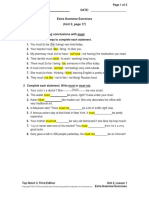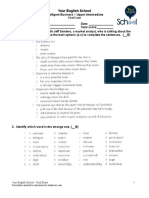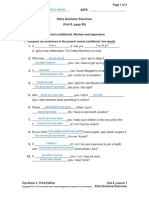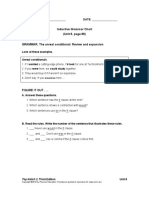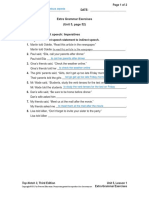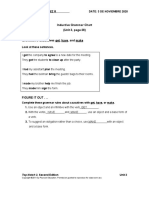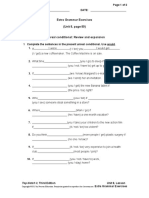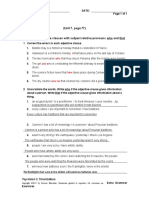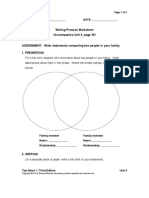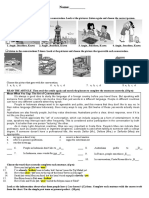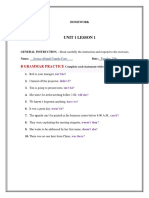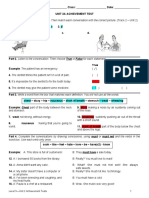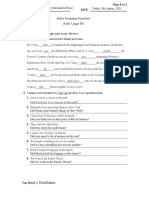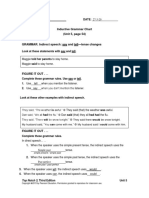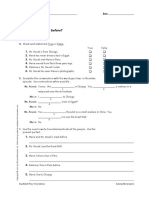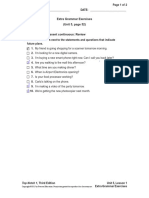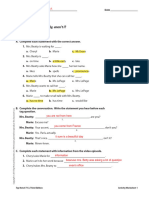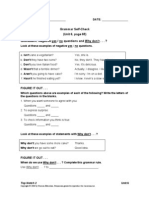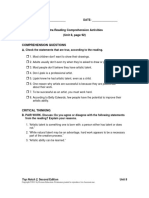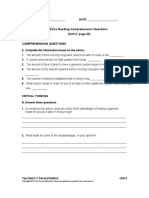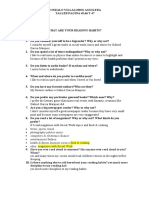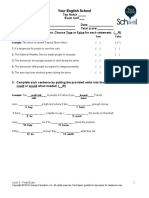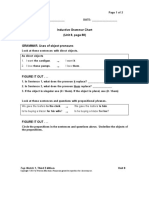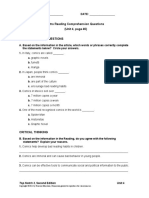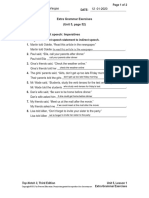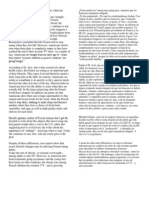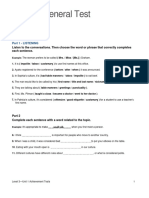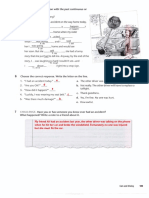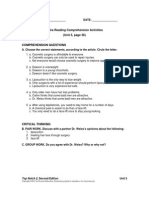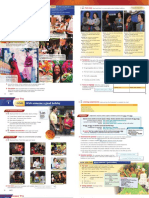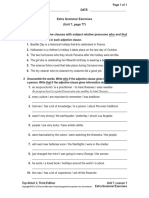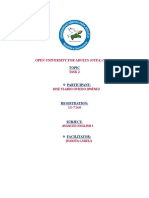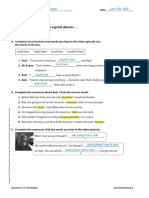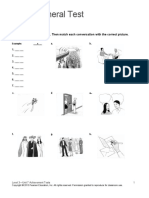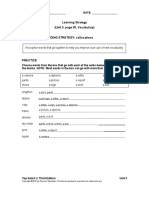Professional Documents
Culture Documents
Inductive Grammar Chart (Unit 6, Page 64) : Giovanny Gomez
Inductive Grammar Chart (Unit 6, Page 64) : Giovanny Gomez
Uploaded by
Giovanny Gomez CuellarOriginal Title
Copyright
Available Formats
Share this document
Did you find this document useful?
Is this content inappropriate?
Report this DocumentCopyright:
Available Formats
Inductive Grammar Chart (Unit 6, Page 64) : Giovanny Gomez
Inductive Grammar Chart (Unit 6, Page 64) : Giovanny Gomez
Uploaded by
Giovanny Gomez CuellarCopyright:
Available Formats
NAME: giovanny
_______________________
gomez DATE: _________________
Inductive Grammar Chart
(Unit 6, page 64)
GRAMMAR. Expressing intentions and plans that changed:
was / were going to and would
Look at these examples with was / were going to and would.
1. I was going to get married (but I didn't).
They were going to study art (but they didn't).
2. Was she going to take the course? Yes, she was. / No, she wasn’t.
Were you going to study with Dr. Mellon? Yes, I was. / No, I wasn’t.
Weren’t you going to study law? Yes, I was. / No, I wasn’t.
3. Where were they going to work? In Kuala Lumpur.
Who was going to teach this class? My sister was.
4. She thought she would be a doctor (but she changed her mind).
We always believed they would get married (but they never did).
They said they would pay for their daughter's studies (but they didn't).
They said they were going to arrive before noon (but they didn’t.)
FIGURE IT OUT . . .
A. Complete these grammar rules.
1. Use was or were + ________
going ________
to + the base form of a verb to talk about
future plans or expectations that existed in the past.
2. _______________
would + the base form of a verb can also express this.
B. Answer these questions. Write yes or no in the blank.
no
1. In example 1, did the plans actually happen? _______________
2. In example 2, can these questions be answered both negatively and
yes
positively? _______________
3. To express plans and intentions that changed, you can also use verbs like _____,
would
_____, or ____
thought said + was/were going to.
Top Notch 3, Third Edition Unit 6
Copyright 2015 by Pearson Education. Permission granted to reproduce for classroom use.
You might also like
- Extra Grammar Exercises (Unit 2, Page 17) : Top Notch 3, Third EditionDocument4 pagesExtra Grammar Exercises (Unit 2, Page 17) : Top Notch 3, Third EditionalfredespinosaNo ratings yet
- Extra Grammar Exercises (Unit 7, Page 77) : It They She Novel HeDocument3 pagesExtra Grammar Exercises (Unit 7, Page 77) : It They She Novel HeYolaine Babilonia Burgos0% (1)
- Level 3 Student Book Unit 1Document12 pagesLevel 3 Student Book Unit 1Bassem MohamedNo ratings yet
- Tn3-Final Exam 09Document4 pagesTn3-Final Exam 09UserMotMooNo ratings yet
- Extra Grammar Exercises (Unit 8, Page 89) : Did You GoDocument1 pageExtra Grammar Exercises (Unit 8, Page 89) : Did You GoJohan Getzemani Valle LaraNo ratings yet
- UNIT 08 Extra Gram ExercisesDocument4 pagesUNIT 08 Extra Gram ExercisesBrightnessNo ratings yet
- Unit 8 Lesson 1 Inductive Grammar Charts (Portfolio)Document1 pageUnit 8 Lesson 1 Inductive Grammar Charts (Portfolio)ROGER ANDRES CABARCAS CASTILLA0% (1)
- GRAMMAR UNIT 6 LESSON 1 Was - Were Going To and Would EloísaDocument3 pagesGRAMMAR UNIT 6 LESSON 1 Was - Were Going To and Would EloísaEloisa Tatiana Macas SolanoNo ratings yet
- UNIT 05 Extra Gram ExercisesDocument4 pagesUNIT 05 Extra Gram ExercisesBrightnessNo ratings yet
- First Mid Term TestDocument7 pagesFirst Mid Term TestJUAN DAVID MONTERROZA SIMPSON ESTUDIANTENo ratings yet
- Inductive Grammar Chart (Unit 3, Page 28) : Top Notch 3, Second EditionDocument3 pagesInductive Grammar Chart (Unit 3, Page 28) : Top Notch 3, Second EditionVanessa Suárez Rodríguez100% (1)
- Extra Grammar Exercises (Unit 8, Page 89) : Top Notch 3, Third EditionDocument3 pagesExtra Grammar Exercises (Unit 8, Page 89) : Top Notch 3, Third EditionMaite Martinez0% (1)
- UNIT 07 Extra Gram Exercises 1Document4 pagesUNIT 07 Extra Gram Exercises 1Omar VargasNo ratings yet
- Writing Process Worksheet (Accompanies Unit 3, Page 36) : NAME: - DATEDocument2 pagesWriting Process Worksheet (Accompanies Unit 3, Page 36) : NAME: - DATEJOSE LUIS LIMACHI CONDORINo ratings yet
- Exam Unit 1 and 2Document4 pagesExam Unit 1 and 2Victor AriasNo ratings yet
- CC JaDocument5 pagesCC JaJessica CepedaNo ratings yet
- Unit 10 - Top Notch 2 - Extra MaterialDocument5 pagesUnit 10 - Top Notch 2 - Extra MaterialKathyPazmiñoViteriNo ratings yet
- Unit 2A Lylley CortesDocument3 pagesUnit 2A Lylley CortesCaro Palta Medina100% (1)
- Extra Grammar Exercises (Unit 7, Page 78) : Mateo Vichenzo Quisnancela Ponce Friday, 15th, January, 2021Document4 pagesExtra Grammar Exercises (Unit 7, Page 78) : Mateo Vichenzo Quisnancela Ponce Friday, 15th, January, 2021Mateo QPNo ratings yet
- TP 03 Unit 09 Workbook Ak PDFDocument1 pageTP 03 Unit 09 Workbook Ak PDFyulianNo ratings yet
- Unit 05 P54 IgcDocument1 pageUnit 05 P54 IgcMicael RDNo ratings yet
- Unit10 Complete Assessment PackageDocument5 pagesUnit10 Complete Assessment PackageAlejandro Paul Apantenco Salas100% (1)
- Unit 1: Sitcom: Have We Met Before? Scene 1Document2 pagesUnit 1: Sitcom: Have We Met Before? Scene 1didier santiago diazNo ratings yet
- UNIT 05 Extra Gram ExerciseDocument2 pagesUNIT 05 Extra Gram ExerciseJULISA MARIA PINEDA LOPEZNo ratings yet
- Inductive Grammar Chart (Unit 1, Page 6) : Top Notch FundamentalsDocument1 pageInductive Grammar Chart (Unit 1, Page 6) : Top Notch FundamentalsSalvador Yana RocaNo ratings yet
- Extra Grammar Exercises (Unit 7, Page 77) : TurnerDocument4 pagesExtra Grammar Exercises (Unit 7, Page 77) : TurnerEliana De Avila ZambranoNo ratings yet
- Inductive Grammar Chart (Unit 4, Page 42) : Top Notch 3, Third EditionDocument1 pageInductive Grammar Chart (Unit 4, Page 42) : Top Notch 3, Third EditionMarcela A. BenitezNo ratings yet
- UNIT 03 Extra Gram Exercises PDFDocument3 pagesUNIT 03 Extra Gram Exercises PDFJD Menco GurreroNo ratings yet
- UNIT 1 Top Notch TVDocument2 pagesUNIT 1 Top Notch TVsentidos188No ratings yet
- Top Notch 2 Grammar Practice Unit 3Document1 pageTop Notch 2 Grammar Practice Unit 3Tamara OoNo ratings yet
- Grammar Self-Check (Unit 6, Page 65) GRAMMAR. Negative Yes / No Questions and Why Don't - . - ?Document1 pageGrammar Self-Check (Unit 6, Page 65) GRAMMAR. Negative Yes / No Questions and Why Don't - . - ?Gabi Castillo100% (3)
- Extra Reading Comprehension Activities (Unit 8, Page 92) : Top Notch 2, Second EditionDocument1 pageExtra Reading Comprehension Activities (Unit 8, Page 92) : Top Notch 2, Second EditionJoan Suarez Tomala0% (1)
- Topnotch 3A Unit 1-5Document14 pagesTopnotch 3A Unit 1-5Mahdi MirzapourNo ratings yet
- Extra Reading Comprehension Questions (Unit 3, Page 32) : Top Notch 3Document1 pageExtra Reading Comprehension Questions (Unit 3, Page 32) : Top Notch 3Daniel Espino Quiroga50% (2)
- Unit 10: Sitcom: That's David Doolittle! Scene 1Document3 pagesUnit 10: Sitcom: That's David Doolittle! Scene 1Luis TerronesNo ratings yet
- TALLER PAGINA 45,46 y 47Document3 pagesTALLER PAGINA 45,46 y 47Gonzalo VillalobosNo ratings yet
- Extra Reading Comprehension (Unit 10, Page 86) Exercises: Top Notch FundamentalsDocument1 pageExtra Reading Comprehension (Unit 10, Page 86) Exercises: Top Notch FundamentalsJennifer Rojas BravoNo ratings yet
- 5ta Tarea de Ingles Avanzado IIDocument30 pages5ta Tarea de Ingles Avanzado IIabiel jimenezNo ratings yet
- TN3-Final ExamDocument4 pagesTN3-Final ExamUserMotMooNo ratings yet
- Inductive Grammar Chart (Unit 8, Page 88) : 1. I Want The Cardigan. I Want It. 2. I Love These Pumps. I Love ThemDocument2 pagesInductive Grammar Chart (Unit 8, Page 88) : 1. I Want The Cardigan. I Want It. 2. I Love These Pumps. I Love ThemAngel Jesus Alvarez SierraNo ratings yet
- Extra Reading Comprehension Questions (Unit 4, Page 46) : Top Notch 3Document1 pageExtra Reading Comprehension Questions (Unit 4, Page 46) : Top Notch 3Daniel Espino QuirogaNo ratings yet
- Extra Grammar UNIT 5.pdf BELENY MINADocument4 pagesExtra Grammar UNIT 5.pdf BELENY MINABELENY MINA VARGASNo ratings yet
- How Can It BeDocument2 pagesHow Can It BeEsthefania Esthefania WolffNo ratings yet
- TN3 Unit 1,2assessmentDocument9 pagesTN3 Unit 1,2assessmentLincoln CourseNo ratings yet
- UNIT 08 Extra Gram ExerciseDocument4 pagesUNIT 08 Extra Gram ExerciseFervii33% (3)
- A: Oh, No! How - It - ?: B: Well, I Home When My SisterDocument1 pageA: Oh, No! How - It - ?: B: Well, I Home When My SistervanesaNo ratings yet
- Top Notch 2 2 Ed UNIT - 05 - Cosmetic - SurgeryDocument1 pageTop Notch 2 2 Ed UNIT - 05 - Cosmetic - SurgeryCristian Rendon100% (1)
- Unit7 Student Book PDFDocument6 pagesUnit7 Student Book PDFKaren AngelNo ratings yet
- Extra Grammar Exercises (Unit 7, Page 77) : Top Notch 3, Third EditionDocument1 pageExtra Grammar Exercises (Unit 7, Page 77) : Top Notch 3, Third EditionROGER ANDRES CABARCAS CASTILLANo ratings yet
- Top Notch 2 Grammar Practice Unit 5Document1 pageTop Notch 2 Grammar Practice Unit 5Tamara OoNo ratings yet
- Avanced English Task 2Document9 pagesAvanced English Task 2jos oviedoNo ratings yet
- UNIT 06 TV Activity WorksheetsDocument3 pagesUNIT 06 TV Activity WorksheetsSharonNo ratings yet
- Extra Grammar Exercises (Unit 2, Page 17)Document2 pagesExtra Grammar Exercises (Unit 2, Page 17)katheryn jachoNo ratings yet
- Word Box. Use Each Verb Only Once.: Level 3-Unit 2 Achievement Tests 1Document3 pagesWord Box. Use Each Verb Only Once.: Level 3-Unit 2 Achievement Tests 1Caro Palta MedinaNo ratings yet
- TN3 Unit 7 Test-10-12Document6 pagesTN3 Unit 7 Test-10-12Samuel MuñozNo ratings yet
- Unit 7 - Writing EssayDocument2 pagesUnit 7 - Writing EssayGretta Bianca SicsúNo ratings yet
- Learning Strategy (Unit 3, Page 30, Vocabulary) : NAME: - DATEDocument1 pageLearning Strategy (Unit 3, Page 30, Vocabulary) : NAME: - DATETaty Cerrato de JorqueraNo ratings yet
- Unit 3 GR.BDocument4 pagesUnit 3 GR.BBasit73No ratings yet
- Unit 9 Cities of The Future Lesson 2 LanguageDocument17 pagesUnit 9 Cities of The Future Lesson 2 Languageminhhung238No ratings yet
- Cuadernillo Inglés 1P 3SDocument9 pagesCuadernillo Inglés 1P 3SGael DLCVNo ratings yet
